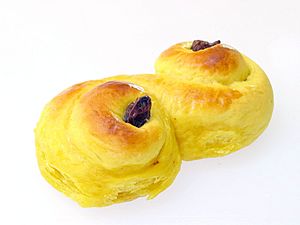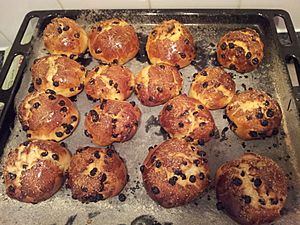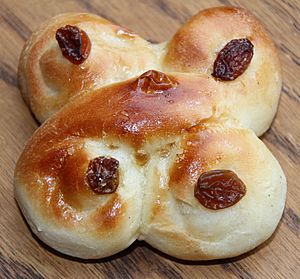Saffron bun facts for kids
 |
|
| Alternative names | Saffron cake, saffron loaf, tea treat bun, |
|---|---|
| Type | Sweet roll or yeasted cake |
| Place of origin | Cornwall, Netherlands, Sweden |
| Main ingredients | currants or raisins, saffron, cinnamon or nutmeg |
A saffron bun is a tasty, spiced sweet bread. It's made with yeast and gets its special flavor and yellow color from saffron. These buns often have dried fruits like currants and raisins inside. You might also hear them called a Cornish tea treat bun or revel bun.
Saffron buns are a type of sweet roll. They are made from flour, butter, yeast, sugar, currants, and sultanas. Sometimes, larger versions are baked in a loaf pan. These bigger ones are known as saffron cake.
What is a Saffron Bun?
Saffron buns are a popular treat. They are a type of sweet roll that uses yeast to make them soft and fluffy. The most important ingredient is saffron. Saffron is a very special spice that gives the buns their unique taste and a beautiful yellow color.
The buns also contain dried fruits. These usually include currants and raisins. The main ingredients are simple: plain flour, butter, yeast, sugar, and the dried fruits.
Saffron Buns Around the World
Similar buns are popular in other countries too. In Sweden, they are called lussebulle or lussekatt. In Norway, they are also known as lussekatt. These buns are very much like the ones found in Cornwall.
History and Traditions
Saffron buns have a long history, especially in Cornwall, England. Here, they are sometimes called "revel buns." They were traditionally baked for special parties or events. These events could be anniversary feasts or even church celebrations.
Saffron itself used to grow in the mild climate of Devon and Cornwall. However, people probably traded for saffron from places like Spain for many years. In western Cornwall, large saffron buns are also known as "tea treat buns." These buns are often linked to Methodist Sunday school outings.
Saffron Buns in Sweden and Norway
In Sweden and Norway, saffron buns are a big part of their traditions. These buns, called lussekatt, do not usually have cinnamon or nutmeg. They use raisins instead of currants.
The buns are often shaped in fun ways. A common shape is a simple reversed S-shape. People traditionally eat them during Advent. This is the time leading up to Christmas. They are especially popular on Saint Lucy's Day, which is December 13. These traditions are also found in Finland, especially where people speak Swedish.
Why Are Saffron Buns Yellow?
Saffron is known for its bright yellow color. It is also the most expensive spice in the world by weight! Because saffron is so costly, bakers often use food dyes. These dyes help to make the buns even more yellow.
Adding food coloring to Cornish saffron buns became common a long time ago. This started around the end of the First World War. Saffron was hard to find then, so bakers looked for other ways to make their buns colorful.
 | Ernest Everett Just |
 | Mary Jackson |
 | Emmett Chappelle |
 | Marie Maynard Daly |



